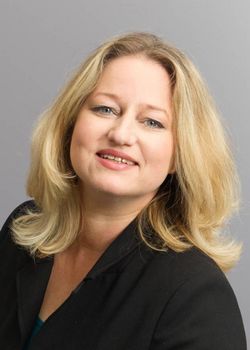Dr. agr. Bettina Rudloff
EU/Europe Senior Associate
Thematic working group economic and technological transformations Co-Chair
Areas of Expertise
- Agriculture policy
- Crisis management
- Development cooperation
- EU foreign trade policy
- Foreign trade policy
- Global nutrition
Investment Treaties, International regulatory cooperation
Short Curriculum vitae
Positions
Since 2008 Senior Associate at SWP
Institute for Research on European Integration (IEIF), University of Bonn (Assistant Professor), European Institute for Public Administration (Lecturer)
Current Memberships/Councils
Member of the strategic advisory board of the special initaitve »Transformation of Agricultural and Food Systems« of the Federal Ministry for Economic Cooperation and Development (BMZ), member of the working group BMZ/BMEL Welternährung, member of the International Agricultural Trade Research Consortium (IATRC), member of The Trade and Public Policy Network (TaPP), member of the TradeExperettes, contributed as an external author to the latest report of the Scientific Advisory Council to the BMEL (WBAE) on corporate due diligence in the agricultural and food sector.
Project Lead/Expert Reports
Sustainability covered by agricultural policy (University of Bonn), Training programme of WTO negotiators from developing countries at the European Institute for Public Administration (EIPA), EU as an arctic actor (SWP), Comprehensive Economic and Trade Agreement (Bundestag), Agricultural Policy and Impact Africa (EU Commission), Sustainability challenges of the EU-Mercosur-Agreement (report for the European Parliament 2021), Geostrategic aspects of policies on food security in the light of recent global tensions – Insights from seven countries (IATRC)
current: Agriculture and food security at the G7 (in: Andreas Freytag, Peter Draper (eds), The Elgar Companion to the G7, 416 pp (174-200), December 2025), 'Mirroring': The scope and limitations of EU trade agreements and autonomous actions (European Parliament, October 2025) A comprehensive analysis of the updated trade part of the EU-Mercosur Partnership Agreement (European Parliament, June 2025) and An update on the economic, sustainability and regulatory effects of the trade part of the EU-Mercosur Partnership Agreement (European Parliament, June 2025).
SWP Publications
-
The EU between unilateral sustainability approaches and bilateral trade agreements
Paths to better partnerships
Research Division EU/Europe, Working Paper Nr. 05/2025, March 2025, 47 pages -
India on Its Way to Becoming a Global Agricultural Power: Challenges for the EU and Germany
in: India as a Partner of German Foreign PolicyContribution to a Research Paper 2024/RP 17, 28.11.2024, 32 Pages, pp. 13–18
-
Trade Policy: What Gender Equality Means and What It Could Mean
in: Feminist Foreign and Development Policy in PracticeContribution to a Research Paper 2024/RP 09, 21.06.2024, 81 Pages, pp. 49–53
-
Foresight*: Pathogens from the Permafrost
Combating the Spread of an Animal-borne Disease with or without Russia
SWP Comment 2024/C 23, 21.06.2024, 7 Pagesdoi:10.18449/2024C23
-
(No) bridge over troubled water: Maritime food transport as networked critical infrastructure of the EU
Research Division EU/Europe, Working Paper Nr. 01/2024, March 2024, 17 Pages -
EU-Mercosur Agreement: The EU must overcome its trade impasse
It could become the world’s largest free trade area. As a condition for the EU’s unilateral requirements, the Mercosur countries are now demanding cooperation and trade benefits – rightly so, and it will set an example for other agreements, say Bettina Rudloff and Tobias Stoll.
Point of View, 26.09.2023
Publications of the Megatrends Afrika project
-
The Russia-Ukraine War’s Shockwaves in Africa. A Zeitenwende for German Africa Policy?
Two years after Russia’s invasion of Ukraine began, this Working Paper examines repercussions in Africa and on German Africa policy, analysing to what extent they are in continuity with trends that preceded the war and to what extent they represent a break with past patterns. Has the Ukraine war turned out to be a sea change for Africa and German Africa policy, too?
Megatrends Working Paper 2024 10, 13.02.2024, 39 Pagesdoi:10.18449/2024MTA-WP10
-
The Ukraine war and food security in Africa: “Meeting the acute needs is not solving the general problem.”
Since the Russian invasion of Ukraine began, we have been witness to a humanitarian catastrophe unfolding in the Black Sea region. At the same time, another one is already looming on the horizon in many African countries. The loss of grain and food imports means that it will be more difficult for Africans to obtain these goods and, above all, pay for them. We spoke to agricultural economist Bettina Rudloff (SWP) about why food security in Africa is often dependent on imports and what options for action exist for African and international actors. She argues that we already have valuable initiatives and tools at our disposal, but we lack a strategic approach. Cooperation with so-called non-traditional humanitarian donors such as China is also an option.
Megatrends spotlight 2022 07, 16.05.2022
External publications
-
Agriculture and food security at the G7
in: Andreas Freytag, Peter Draper (eds), The Elgar Companion to the G7, 416 pp (174-200), December 2025 -
‘Mirroring’: The scope and limitations of EU trade agreements and autonomous actions
European Parliament, Study Requested by the INTA committee, PE 754.486, October 2025 -
Mitigating food security impacts from crisis in high-income countries: lessons from different contexts
in: Food Policy, Volume 137, November 2025doi:10.1016/j.foodpol.2025.102956
-
An update on the economic, sustainability and regulatory effects of the trade part of the EU-Mercosur Partnership Agreement
European Parliament, Study Requested by the INTA committee, PE 754.476, June 2025 -
A comprehensive analysis of the updated trade part of the EU-Mercosur Partnership Agreement
European Parliament, Study Requested by the INTA committee, PE 754.477, June 2025 -
Due diligence in agricultural value chains: sector specific challenges and chances
in: Research Network Sustainable Global Supply Chains, 12.05.2025
